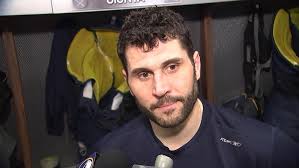By Jourdon LaBarber @jourdonlabarber / Sabres.com
It’s never easy to get Brian Gionta to talk about Brian Gionta, and it’s rare that he even gets the opportunity. It’s an aspect of speaking with the media that comes with being the captain – Gionta often has to answer for the play of the team rather than his individual performance, especially in trying times.
It also stems from Gionta’s tendency to define his personal success not by numbers – although, statistically, he’s having what might be his best season as a Sabre at age 38 – but by team success. His role over a 15-year career has changed with what’s been asked of him.
But on Monday, if only for one night, the subject of Gionta’s personal accomplishments will be unavoidable. The captain of the Buffalo Sabres will play his 1,000th NHL game, the culmination of a journey that began 76 miles east of Buffalo in a suburb of Rochester.
“Obviously it’s a pretty cool milestone to have reached,” Gionta said on Sunday, a day before the benchmark game against Florida. “Just fortunate that some people believed in me back in the day, the Devils for giving me a chance to break into the League. I never would thought about it would last this long, but I’m just happy to be a part of it.”
That’s the type of modest answer you tend to get from Gionta. To truly understand what he’s meant to three organizations over the span of 15 seasons and 999 games, you need to speak to the people that know him best.
‘Illiterate to the process’
When Brian was young and would say he wanted to play in the NHL, his parents would entertain their son with modest skepticism.
“We kept shaking our heads,” Penny Gionta said. “OK, if you say so.”
It’s not that Penny and Sam Gionta didn’t believe in their son. They did. They were simply, as Penny puts it now, “illiterate to the process” of becoming a professional hockey player. Sam owned a hardware store in their hometown of Greece, N.Y., and didn’t even know how to skate. Penny worked part-time as a dental hygienist.
But winters tend to get cold in Western New York, and thus Penny decided hockey would be a good way to keep her boys active when soccer wasn’t an option. The journey for Brian began as innocent recreation. His parents never thought of one professional game as a possibility, let alone 1,000 at the highest level.
Brian was the middle of three children. Joe, the oldest, was his protector when the two played together in high school. As Penny recalls, “Joey got the penalties, Brian got the goals.” Brian, meanwhile, mentored their youngest brother, Stephen, all the way to the NHL.
Having never played the game himself, Sam made up for what he lacked in hockey knowledge simply by supporting his sons. When Brian spent one year playing minor hockey in Syracuse, for example, Sam would spend the hour-long drive home remembering individual plays and asking Brian why he made certain decisions.
In a way, Sam learned the game from his sons. In turn, the boys had an understanding of how they played at a young age. To this day, Brian and Stephen both call their father after games.
“It was a family effort,” Brian said. “Without their support, obviously I wouldn’t have been where I was.”
As Brian got older, the next steps in his progression became apparent because the opportunities sought him. He began at a Learn to Skate program at age 5. From there, he was picked up to play minor hockey in Syracuse, where he was seen by scouts from USA Hockey, who invited him to their camps.
He played junior B hockey in Rochester, junior A hockey for the Niagara Scenics (now the Buffalo Jr. Sabres) and, finally, earned a scholarship to Boston College.
It was a place, Sam says, that the Giontas would have never been able to afford to send their son otherwise, and a moment that made all the long drives worth it.
“That was, in our eyes, the pinnacle,” Sam said.
At Boston College, Brian would become a three-time finalist for the Hobey Baker Award and captain the Eagles to a national championship in 2000-01. It was during those four years – from a luxury box in Buffalo on June 27, 1998, to be exact – that Sam and Penny could finally believe their son would be a professional hockey player.
In the third round, in front of family and friends an hour away from his hometown and in the building that would become his home more than a decade later (as well as the site of his 1,000th regular-season NHL game), Brian was drafted by the New Jersey Devils.
“It just was like, wow, that’s really him,” Penny recalls. “You kiss him goodbye so he could go down to the floor.”
“I think he maybe knew that he could do it before we had the same feeling,” Sam said. “I don’t think it was too far from his mind.”
Small in stature, big in heart
It only took three months of AHL hockey in Albany before Brian received his first call-up to New Jersey. The Devils were already on a road trip out west, so Brian flew out to meet the team and made his NHL debut on Dec. 30, 2001 in Edmonton.
It was a different League back then. Go to a game today and you might see the offensive talent of players like Cam Atkinson or Johnny Gaudreau, both of whom stand a few inches below 6 feet. Back then, it wasn’t the norm to see a player with the stature of a Brian Gionta, listed at 5-feet-7-inches tall.
“A lot was different,” Brian said. “There was a lot of clutching and grabbing, no two-line passing, there were a lot of different things to slow you down and make it easier to grab you. But, like I said, if it wasn’t for Lou Lamoriello and the Devils for giving me that chance … They believed in me right from the minute I came on that team.”
Even Brian’s father admits to remembering sitting at ice level for that first NHL game, seeing the size of the other players and just hoping his son would come out alive.
“That’s when you realized he could compete with them,” Sam said.
Stephen, who stands at the same height as his older brother, credits Brian with providing the template to him for how to succeed as a small player: by getting into battles, stepping up to the challenge against players who were larger. Stephen followed in Brian’s footsteps to Boston College and then to New Jersey. Now with the New York Islanders, Stephen has 288 NHL games under his belt.
“They knew what they wanted,” Penny said. “Being small, they needed to play harder. They became more determined because they constantly were told, ‘You’re so small, you can’t do that. There’s no way.'”
As it turns out, Brian faired pretty well. He won the Stanley Cup with New Jersey in 2003 and represented the United States at the Olympics in 2006.
“He’s small in stature but big in heart, big in commitment,” said Josh Gorges, Gionta’s teammate for eight seasons in Montreal and Buffalo. “You look at him, and I’m sure everyone told him from the time he was probably 10 years old, he was too small to play hockey. Too small. He’ll never make it. Not only did he make it, he succeeded beyond expectations.”
‘Just look at Brian Gionta’
Gorges still remembers when Gionta signed with the Montreal Canadiens in the summer of 2009. Here was a guy, age 29, who was joining his team and being talked about as someone known for his leadership.
“What does that really mean?” Gorges recalls thinking. “And then you get to see it and play alongside a guy that’s won a Stanley Cup. He knows what it takes to win. He’s won at all levels. And then you just watch how he prepares, how he commits to excellence, the mental side of the game, the physical side of the game.”
Today, Gorges refers to Gionta not only as a lifelong friend, but as a person he looks up to. Their wives are close. Their families are close.
Gionta signed with the Sabres as a free agent in 2014 and that became a deciding factor in Gorges’ decision to waive his no-trade clause for a move to Buffalo as well.
“When it came to the hockey aspect of things, you knew you had a guy you could lean on,” Gorges said.
The two hallmarks of Gionta’s career may be leadership and adaptation. The latter can be seen in his longevity. He began as a player the Devils counted on as a checking presence, evolved into a go-to scorer (he scored 48 goals in 2005-06, still a Devils franchise record), and now has come full circle as someone who is relied upon on both ends of the ice for the Sabres.
His 14 goals this season are his most in three seasons as a Sabre, but he’s also a presence on the penalty kill and on their checking line.
Sabres coach Dan Bylsma said it’s the ultimate compliment, in his eyes, to be referred to as an “old guy” in the NHL, but adds that Gionta is still “playing like a young man.” Gionta is old enough to have played against Bylsma for the first few years of his career, and that type of staying power doesn’t come without a willingness to adapt.
“He’s a team guy,” Gorges said. “He had his success individually, but I think that stemmed from him being willing do to what was asked from him from a coach’s perspective or even from one of your teammates. He was always there.”
That selflessness plays into his abilities as a leader. He was the captain both of his junior team at Niagara and at Boston College (legendary Eagles coach Jerry York, in an e-mail to Sabres.com, described Gionta as “easily one of the best leaders to come through the program”).
In 2010, he became the first American to not share the revered title of captain of the Montreal Canadiens (Chris Chelios and Guy Carbonneau were co-captains in 1989-90), and Gionta has captained the Sabres since his arrival in Buffalo.
For one of the youngest teams in the NHL, and one that expects to count on second-year players like Jack Eichel and Sam Reinhart for years to come, his presence has been invaluable.
“I’ve said it before and I’ll say it again,” Bylsma said. “You want to know how to be a professional? You want to know how to work? You want to know how to do it right? Just look at Brian Gionta. That’s what I hope our young players look at and learn form and take to their own games.”
When asked about what they’ve learned from Gionta, both Eichel and Reinhart immediately spoke of his preparation. It’s not the extent of his pregame routine that’s been eye-opening as much as it is the consistency, which is something Gorges saw early on as his teammate in Montreal.
“It’s kind of the total package,” Gorges said. “It’s the willingness to put in the preparation, to come to the rink early, get yourself ready for practice, get yourself ready for games, mentally focused. He takes care of himself.
“And he’s a good guy. If anything, he treats people with respect. And I think, in turn, he gains a lot of respect from the people around him. That’s something, if you’re a young guy, you look at. And respect it’s a big word, but it’s a big part of his game.”
Gionta has maintained his plans to play beyond this season, and there’s nothing about his game that says he won’t be able to. He’ll continue to be whatever his team needs him to be, an old guy in the League still working like a young man.
But for one day, as uncomfortable as it may make him, Monday night will be about Brian Gionta.
(Reprinted with permission of the Buffalo Sabres and NHL.com)







